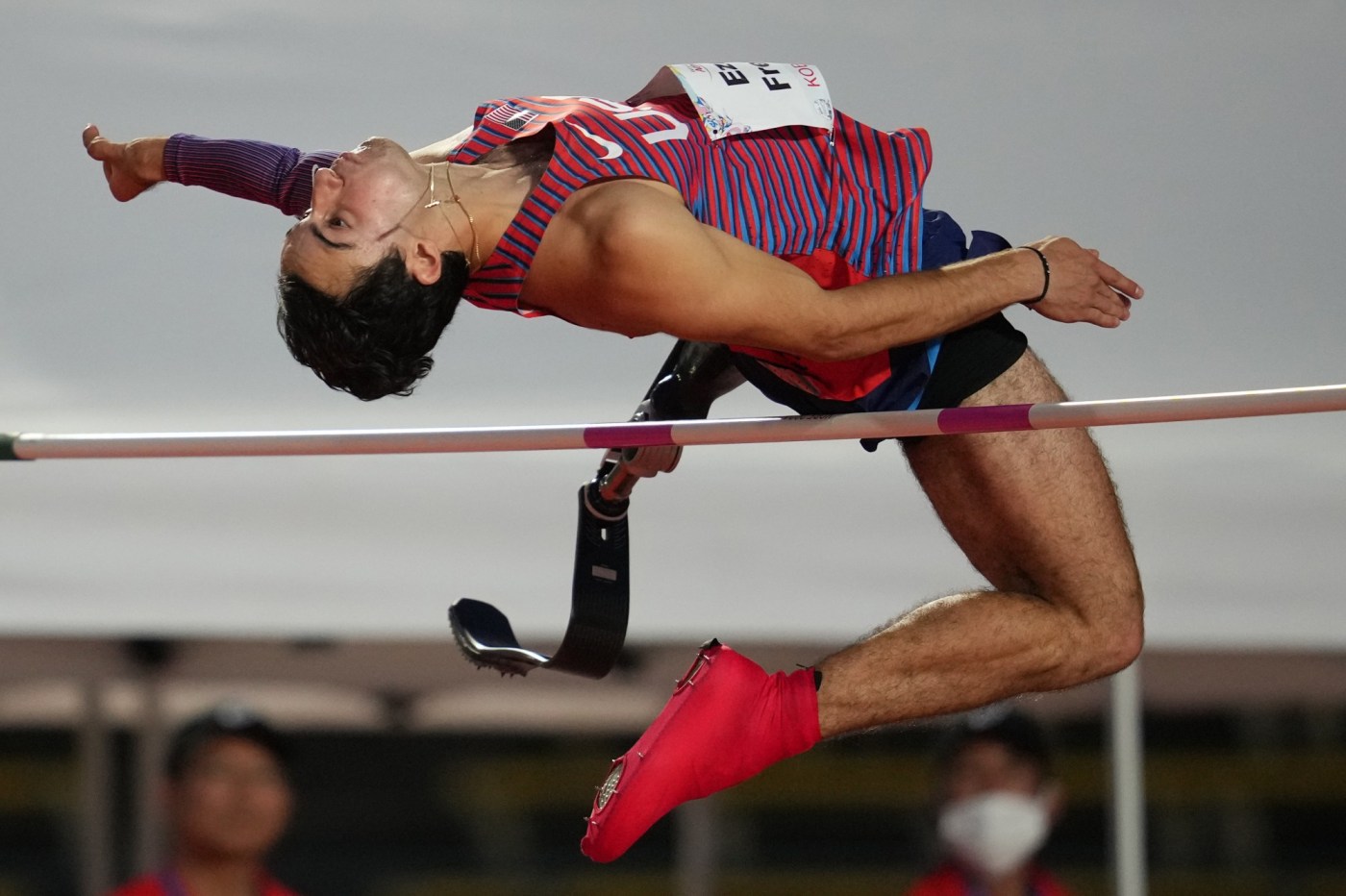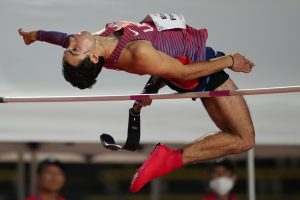
Ezra Frech wants to be a Paralympic champion, and a champion for the disability community
ALISO VIEJO — Most things bore Ezra Frech, by now. Most things always have.
The birdsong is quiet by the track at Soka University on a July afternoon, and the branches of the surrounding tree canopy barely shiver from the warm breeze through the San Joaquin Hills, and Frech is the only consistent source of noise on campus. The 19-year-old Paralympian talks while he stretches, raising his voice as he presses a Theragun to his thigh. He talks while he rolls a sleeve over the stump of his left leg. He talks while he suctions a running blade to his knee. His sentences brake and accelerate, crashing into one another, a young man cursed with a self-described ambitious mind.
He went to bed at 10 p.m. on the Fourth of July. Parties bore him. Kickbacks bore him. TV series, movies – any self-described “stupid piece(s) of content” – bore him. The same itch, invariably, creeps in.
“I,” Frech says, “could be saving the world right now.”
He was born with congenital limb differences and fingers missing on his left hand, his left leg amputated when he was 2½ years old. By 9 years old, he was speaking on “Ellen” as an advocate for people with physical disabilities in sports. By 11 years old, he’d solidified a dream to become a Paralympian.
Everyone on Earth, Frech feels, has a butterfly effect. This is his. He has spent his young life sharing the story of his young life, preaching to an ever-growing audience of more than 500,000 combined followers on Instagram and TikTok. A few months ago, he committed to USC for track and field, becoming – according to Team USA – the first above-the-knee amputee to earn a Division I track and field scholarship. His very purpose as a human being, Frech believes, is centered around two realities.
1) His life’s calling is to change the way the entirety of human society views disability.
2) To do that, he must become the greatest Paralympian of all time.
“I believe I can be that person,” Frech says, with all the self-assuredness of a grown adult and all the self-assuredness of a 19-year-old. “But you have to win. Have to win. No one cares if I don’t win, you know?”
Frech drove from Los Angeles to Aliso Viejo for a workout, repeating the same manifestations to himself into the thin air inside his orange Toyota.
I am the Paralympic champion. I am the Paralympic champion. I am the Paralympic champion.
A couple of hours later, he walks back to the edge of the track at Soka, trying to place himself in Florida, host of the Paralympic trials July 18-20.
“Game on the line,” coach Ryan Sanders shouts, waiting by a high jump bar.
“Game on the line,” Frech mutters.
He claps three times. He bellows, for nobody but himself. Wooh! And he bounds toward the bar, leaps, bends – and nicks it off with his right leg.
Frech comes up wincing. Damn. He reviews the film with Sanders. Another, he decides, walking back to the edge of the track. He claps three times. He bellows, for nobody but himself. Wooh! And he bounds toward the bar, leaps, bends – and nicks it off, again, with his right leg.
By all accounts, they are encouraging failures, his leg the only part of his body that touched the bar. Frech smiles. But he still chides himself, watching the last attempt back on Sanders’ camera.
“Ah, Jesus,” he mumbles, a young man who holds himself against a much grander scale.
Somewhere, a butterfly flaps its wings.
Shooting for a world record
Three days earlier, more than 5,600 miles away in Leverkusen, Germany, a jumper from the Netherlands named Joel de Jong obliterated the Paralympic long-jump world record in Frech’s T63 class with a mark of 7.67 meters.
For several minutes on the track, it’s all Frech can talk about, and he can talk about plenty. “How (expletive) crazy is that?” he asks Sanders, who shakes his head in agreement.
Frech’s eyes pop. Wide. Now, he tells Sanders, he has to jump 7.50 meters in Paris come late August. He pulls out his phone, showing his coach a video of a recent workout, where he performs step-ups with heavy chains draped around his neck – on his amputated leg.
“I called Ari, my strength and conditioning coach,” Frech says, “and I said, ‘We got to go crazy on the left side.’”
Ari is Ariyon Tolbert, a trainer who first met Frech two years ago at a mutual friend’s house. That day, Tolbert asked Frech if he wanted to hit some core exercises. The kid agreed, and started doing sit-ups. He hit Tolbert’s target number, and kept going. And kept going.
“He embraces difficulty,” Tolbert said, “like nothing I’ve ever seen before.”
Every day since May 26, Frech has posted a day-in-the-life TikTok to his account – username “One leg man” – labeled “Day X/100 until I win Paralympic Gold.” And his goal at the Paralympic trials, held a month before the Games kick off in late August, isn’t simply to qualify. Frech wants to shatter his own high-jump world record, set at last year’s Para World Championships in Paris.
“If I come in jumping my world record of 1.95 (meters) and I don’t jump above it because I want to save it for the big moment, then the energy there is totally different,” Frech says Tuesday, “than if I were to be walking into Paris having blown out the world record.”
“These guys are thinking to themselves, ‘No way.’”
The blatancy here isn’t new. Before those World Championships in 2023, a friend called Frech and suggested he stop so publicly verbalizing his goals. Family members have told him the same. His peers back at Brentwood High, Frech said, thought he was cocky. Folks in his DMS think he’s cocky, too.
He is cocky. Frech wants people to think he is. He wants the public to see an unafraid 19-year-old, a torchbearer for those beaten down by society. He was raised from a young age by parents Clayton and Bahar – the former the CEO of non-profit Angel City Sports, the latter a longtime actress in “Crash” and the “Saw” franchise – to be unapologetic for his differences.
Growing up, Frech would wear shorts at every opportunity, because he wanted people to see his left leg.
“For me, it’s –” Frech says Tuesday, getting up off a bench to mime puffing his chest out, “‘This is me. This is who I am.’”
He wants eyeballs. Frech points to the Indiana Fever’s Caitlin Clark, riding the momentum created off so many greats before her to explode the popularity of women’s basketball. He points to Michael Phelps, who helped propel Olympic swimming into mainstream coverage. He wants people to watch him in Paris and hope he wins, sure. He wants people to watch him in Paris and hope he fails, too.
“And I won’t,” Frech adds. “But.”
The butterfly effect
A few minutes after Frech finishes his Tuesday workout, he pulls out his phone and points to his background.
The words “Never again” sit underneath the time, superimposed upon two photos. The first shows the medalists at the 2020 Tokyo Paralympics, where a 16-year-old Frech finished fifth in the high jump. The second shows the podium at May’s Para Athletics World Championship in Kobe, Japan, where Frech stands, with eyes of steel, on the second-place step next to Indian winner Mariyappan Thangavelu.
After he lost that May, Frech went up to Thangavelu and shook his hand.
“Congratulations, sir,” Frech told Thangavelu.
“That’s the last one you’ll ever get.”
On Instagram, a few days later, he posted the photo of the winner’s podium in Kobe and tagged Thangavelu as “enjoy.it.while.it.lasts.”
“The truth is, I will never lose another international competition,” Frech tells the Southern California News Group, and he means it.
When Frech returned to the States with a silver medal that May, he received nothing but hearty congratulations. Smiles. Handshakes. Frech smiled back. He shook hands back. He held his tongue. Most people have an average mindset, he believes. So he did not tell them the hurt that burned in his gut, the agony of failing his self-imposed purpose as a human being, because that would be impossible to explain within a smile and a handshake.
If I don’t win, more people with disabilities around the world will die.
He must do this, Frech feels. He must become a Paralympic champion, and a champion for his community, because if he fails – he rattles off, rapid-fire – more in his community will struggle with mental health. They will face fewer job opportunities. They will have less access to physical activity.
And it has to be him. If not him, who else?
“I feel, on my back, the burden of making the world more inclusive for those with disabilities,” Frech says.
Committing to USC in February was a direct step toward that goal, a platform that would allow him to continue working with Angel City Sports, which provides widespread access to adaptive sports opportunities in Southern California, and segue directly into competing in the LA 2028 Paralympic Games. But his college journey won’t be easy. During Frech’s recruitment, USC assistant coach Jeff Petersmeyer told him directly he might not travel to many conference meets at his current marks. At the USC-UCLA dual meet this past year, for example, the lowest long jump mark of the six-person field was 7.16 meters; Frech’s personal best is 6.94 meters, set in March.
Frech doesn’t care. He is prepared to lose in practice, in some capacity, every single day of his college career. But he will invariably step onto the track as part of the field at some future Big Ten meet, and he will compete, and he will post the moment to his hundreds of thousands of social-media followers, and in his eyes traditionally superficial concepts of likes and views will become tiny tangible agents of change in normalizing disability.
“You know how many people are going to be at these track meets with me, thinking, ‘What the hell is happening right now, I didn’t even know someone with one leg can run, and this kid’s out here out-jumping me?’” Frech says. “That’s what I want.”
“I want to break the barriers,” he continues. “I want to shock people. I want to change the way they view someone who’s an amputee.”
He walks off the track Tuesday, and begins climbing the long set of stairs back up to the main campus at Soka, bracing his hand on the railing and hip-swiveling his left leg up every step. On the walk back into the garage, Frech delivers one final message, a direct affirmation of his purpose.
“I genuinely believe I can do it,” Frech says, speaking of the Paralympics, speaking of everything. “At the core of my soul,” he continues, gesturing at his chest, “I think I can do it.”
He climbs back into his Toyota, back for another drive of manifesting a dream he just might shoot high enough to reach.
I am the Paralympic champion. I am the Paralympic champion. I am the Paralympic champion.
This was originally published July 15, 2024 by the Los Angeles Daily News


